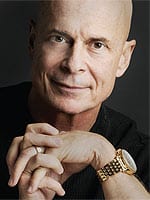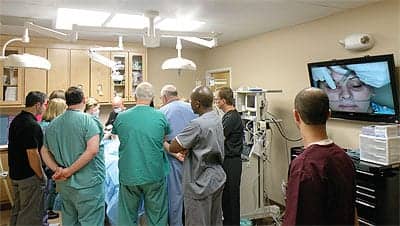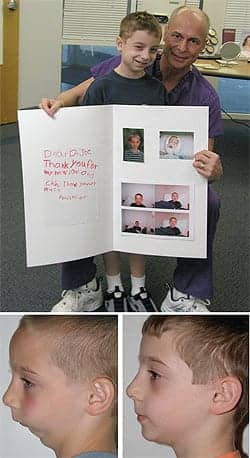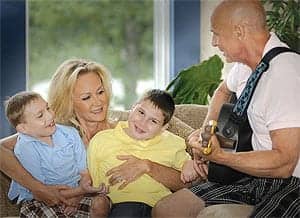Niamtu says his work is his profession and also his hobby.

Joseph Niamtu III, DMD, FAACS
Richmond, Va
How can a successful aesthetic surgeon of 27 years operate his practice 5 days per week and still lecture, write, teach, and make time for family? Just ask Joseph Niamtu, III, DMD, FAACS, of Richmond, Va. As he says, his work is his profession and also his hobby.
“We all look in the mirror and we all possess some level of vanity,” Niamtu says. “People spend hours making their homes, lawns, and cars look better. When a person gets run down and tired looking, it affects their self-confidence, energy level, the way they interact with others, and their general happiness. By making them look younger, it often revitalizes their entire persona. They return to the office looking and feeling happier. I did a little something to change their lives in a positive manner. I love that feeling.”
“Best Speaker”
Niamtu’s 5,500-square-foot practice is limited to aesthetic facial surgery. This year, he was voted “Best Plastic Surgeon to Take You Back 20 Years” by Richmond magazine, and has received numerous “Best Speaker” awards at multispecialty meetings.
Why did he choose to specialize in aesthetic facial surgery?
“I observed some hometown maxillofacial surgeons in Ohio performing a complex facial fracture repair and was hooked. I was totally fascinated with the surgery and the anesthesia. That day, I said, facial surgery is what I am going to do,” he says.
Trying to find a reward and challenge at the end of the day, after practicing the same profession for almost 3 decades, may be daunting for some, but not for Niamtu. What it is about his job that gives him the most satisfaction?

“As my practice is limited to cosmetic facial surgery, making people look and feel better is an awesome reward for me,” he explains. “My art form can truly give patients self-confidence and change their life. I also do a lot of pro bono surgery on needy children and adults.”
Giving back to the community is something that has always been important to Niamtu.
“Cosmetic surgery is not a necessary procedure,” he says, “but performing reconstructive or corrective surgery on children, special needs patients, or victims of abuse gives me a true feeling of accomplishment and raison d’être.”
Niamtu has been honored with the Richmond Times-Dispatch Newspaper Community Service Award for his volunteer work on Third World children with facial deformities. In addition, he has received community service awards from the Greater Richmond Arc and Safe Harbor Domestic Violence Shelter, and has been active with Operation Smile and Noah’s Children, International Hospital for Children, and Medical Care for Children.
The Art of Building a Rapport with Patients
Physician-patient relationships are the basis of a successful practice, according to Niamtu. On his Web site, he shares information with his patients regarding ways to choose the right surgeon for facial surgery and guides patients on what to look for when considering a practitioner.
Failure to be able to see or speak to the surgeon easily is a warning sign that clients may be treated more like a number than a specialized patient, he observes. “The doctor-patient relationship is the joy of practice,” he notes. “It is a time-honored bond that can bring much joy and satisfaction to my life. Patients trust us and look to us for the right advice and treatment. I always feel honored when a patient chooses me for his or her surgeon.”

When it comes to following safety guidelines and procedures, Niamtu and his staff are on top of their game. Each patient gets VIP treatment, with the patient’s health and welfare being their primary concern.
A physician’s staff is a very important aspect of a patient’s surgical experience and recovery, according to Niamtu, adding that his practice is accredited for safe surgery and anesthesia.
“The best single thing I ever did to promote safe surgery and anesthesia was to become AAAHC-certified,” he says. “We have been accredited for over a decade, and it has made us better surgeons and staff. The accreditation process forces the office to maintain contemporary standards of safety, and this initially was a burden, but I really enjoy the process now. I truly believe that this vigilance pays off in safety and efficiency. Many surgeons are resistant to accreditation as it can be a lot of work; but again, it is worth every hour of work and penny of cost.”
Finding Time to Unwind
As a rule, the best surgeons are very active in learning, teaching, and publishing in medical journals and textbooks, Niamtu says.
Luckily, writing is his hobby and what helps him relax. He has published hundreds of scientific articles, papers, textbooks, and textbook chapters on aesthetic facial surgery since 1997. His work has been featured in multiple newspapers, Women’s World magazine, and The London Times Sunday Magazine; and he has also been featured on television networks for his work. This year, he published a 1,000-page textbook with 3,300 color images and also authored a DVD series for aesthetic surgeons.
He learns more when he teaches, and he frequently presents lectures to all types of aesthetic surgeons, including plastic surgeons, facial plastic surgeons, ophthalmologists, ENTs (ear, nose, and throat), and dermatologists. In addition, Niamtu has completed hundreds of hours of continuing medical education on aesthetic facial surgery since 1997.
Other pastimes for Niamtu are physical fitness (which he does 6 days per week), bowhunting and fishing, and spending quality time with his family.
When asked what has been the greatest challenge in his personal or professional life, he answers, “I have 8- and 10-year-old sons with severe cerebral palsy and cognitive impairment. My sons could easily be institutionalized, but my wife (who is also my hero) and I have made the commitment to provide as much love for Joey and Evan as possible.”

Although Niamtu’s boys will never walk or talk, they have taught him so much about love. “If I can play my guitar and make my boys laugh, it is the same feeling that a parent of normal children gets when his son scores a touchdown or gets an A on a test,” he says.
Judging Success
In the business of aesthetic surgery, a poor surgeon does not stay in business long, Niamtu says. Every patient who is treated by a surgeon is a walking advertisement, he adds, stressing that most physicians are very sincere about providing quality surgery and the ones who do not do not stay in business.
What is Niamtu’s advice to plastic surgeons just entering the field? “My advice would be to love what you do,” he explains. “The best surgeons are those who enjoy their profession. I speak to high school students each year, and we discuss success. Most high school students think success is a big paycheck, a big house, or a nice car. I tell them that my definition of success is that when you go to bed on Sunday night, you are excited about going to work on Monday morning. To that end, I am extremely successful.”
Rima Bedevian is a contributing writer for PSP. She can be reached at [email protected].





